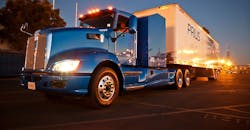Toyota Plans California Fuel Cell Plant to Make Power, Hydrogen
Toyota Motor Corp. said it will build a renewable fuel-cell power-generation plant, plus a hydrogen fueling station, to support its operations at the Port of Long Beach.
The Tri-Gen system will generate 2.35 megawatts of electricity and 1.2 tons of hydrogen a day, enough to power about 2,350 homes and almost 1,500 vehicles, Toyota said Thursday in a statement. It’s expected to begin operations in 2020.
Tri-Gen marks an expansion in Toyota’s effort to harness hydrogen to help the state of California cut pollution from hauling of commercial freight, especially at major ports. The ports of Long Beach, Los Angeles and Oakland handle 40% of U.S. container traffic, with commercial shipments generating half of California’s toxic diesel-soot emissions and 45% of the nitrogen oxide that plagues L.A. with the nation’s worst smog.
The Tri-Gen system from FuelCell Energy Inc. will convert waste materials including manure from California farms into hydrogen, electricity and water. This hydrogen will be used in vehicles including the fuel-cell-powered Class 8 trucks that Toyota is testing now in short-distance fleets that run back and forth between the Long Beach docks and nearby warehouses operated by retailing giants.
“For more than twenty years, Toyota has been leading the development of fuel cell technology because we understand the tremendous potential to reduce emissions,” Doug Murtha, Toyota’s group vice president for strategic planning, said in the statement. “Tri-Gen is a major step forward.”
Zero-Emission Vehicles
California Governor Jerry Brown wants 100,000 zero-emission freight-hauling machines to be operating by 2030 under what he calls the California Sustainable Freight Action Plan.
Fuel cells convert hydrogen into electricity through a chemical reaction. Large ones can power commercial facilities or deliver power to local utility grids. Automakers including Toyota also offer electric cars with smaller versions, a technology that competes with battery-only designs from rivals including Tesla Inc.
FuelCell Energy, based in Danbury, Conn., gained 2.5% to $1.67 at 12:33 p.m. in New York.
By John Lippert and Christopher Martin
About the Author
Bloomberg
Licensed content from Bloomberg, copyright 2016.
